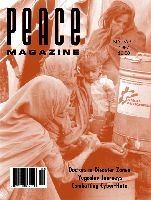
Peace Magazine Mar-Apr 1997, page 30. Some rights reserved.
Search for other articles by Brian Burch here
Philip Berrigan with Fred A. Wilcox. Common Courage Press, 232 pp.
I feel a bit of a conflict reviewing this book, having met Philip Berrigan on two occasions and being a strong admirer of his efforts to make the world less violent. I cannot vouch for my impartiality. With this caveat, I think anyone wishing to understand the drive that leads people to take radical and non-violent stands should read Philip Berrigan's autobiography.
Berrigan was one of the originators of the modern Ploughshares Movement. This is a faith-based initiative rooted in passages found in the Old Testament books of Isaiah and Amos, that tell of a time of peace when all will beat their swords into ploughshares. Whether in Britain disarming helicopters bound for Indonesia or damaging a Trident submarine, these activists take this passage as inspiration. They creatively and publicly physically damage the instruments of mass destruction. Fighting the Lamb's War is a history of this movement, exploring the roots from which it grew and the influences on it. In this biography, we are given glimpses of other civil disobediences by Berrigan, but are led to believe the core of his life is in the Ploughshares Movement.
The influence of a number of activists is described. Rosalie Bertell and Brewster Kneen are mentioned alongside Martin Luther King, Dietrich Bonhoeffer and Dorothy Day. Kneen, for example, was a staff person for the Fellowship of Reconciliation who led Berrigan to a wide range of publications and people, enabling him to confront racism in the American South. Berrigan does a good job of putting into context those he cites as influential.
When dealing with himself, there is less a sense of intimacy than a sense of reading about a third person. I have a better picture of Berrigan's wife, Elizabeth McAlister, or co-accused Helen Woodson, than I have of his own feelings and responses to the stress of being an activist.
Many people familiar with the Berrigan of the 1960s through the 1990s would be surprised by the fact that he was a veteran of the Second World War and grew up in a very violent household. There is a tendency to assume that such a background leads to an embracing of violence or a rejection of conflict. Berrigan's autobiography shows that for most of his life he has neither accepted violence as a justified response to the evils around him nor avoided conflict if the price meant silence. This transformation and his description of the process is what makes the book unique.
Fighting the Lamb's War serves as a summary of a lifetime devoted to making the world better for the future despite any frustration with the overwhelming opposition he faced along the way. In challenging times this biography is a sign of hope.
Reviewed by Brian Burch, a Toronto based social activist and minister.

Peace Magazine Mar-Apr 1997, page 30. Some rights reserved.
Search for other articles by Brian Burch here